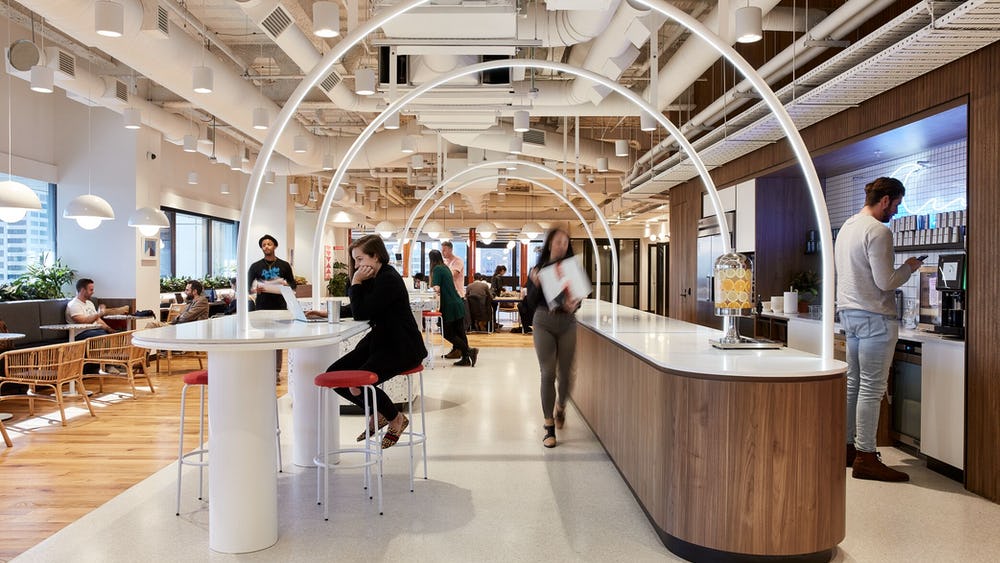Hot Desking 101: A Complete Guide
Hot desking refers to employees sharing a workspace and using any available desk on a first-come, first-served basis rather than having designated workstations. This approach maximizes office space, promotes collaboration, and enhances flexibility.
Hot desking is becoming increasingly popular in modern workplaces for several reasons. In this guide, we will explore the advantages and disadvantages of hot desking, best practices for its successful implementation, real-life case studies, and future trends in this evolving work environment.

Advantages of Hot Desking
- Cost Savings. Hot desking allows organizations to optimize their office space by accommodating more employees in a smaller area. With fewer dedicated workstations, companies can save on real estate costs, making it an attractive option for startups and businesses looking to scale up efficiently.
- Improved Collaboration and Communication. Hot desking fosters a dynamic and open environment, encouraging spontaneous interactions among employees from different teams and departments. This cross-pollination of ideas can lead to increased innovation and problem-solving capabilities.
- Increased Flexibility and Mobility. In a hotdesking setup, employees are not tied to specific desks, allowing them to choose their workspace based on their daily needs. This flexibility is especially beneficial for remote or traveling employees who visit the office occasionally.
- Boosted Creativity and Innovation. The diverse and ever-changing work environment of hot desking can stimulate employee creativity. Exposure to different perspectives and environments can lead to fresh ideas and unconventional solutions.
- Enhanced Employee Engagement and Satisfaction. Providing employees the freedom to personalize their workspace and choose where they work can boost their sense of autonomy and control over their work environment. This, in turn, can lead to higher job satisfaction and overall engagement.
Disadvantages of Hot Desking
- Potential for Distractions and Interruptions. A shared workspace may lead to more noise and interruptions, hindering productivity for some employees who require focused concentration.
- Lack of Personal Space and Belongings. Not having a dedicated desk may make it challenging for employees to personalize their workspace and keep personal belongings secure, leading to a loss of ownership.
- Difficulty in Building Relationships and Team Culture. Building strong interpersonal relationships and team culture can be more challenging without fixed teams sitting together. Employees may feel disconnected from their colleagues.
- Health and Hygiene Concerns. Hot desking increases the likelihood of germ transmission, as multiple individuals use the same desk and equipment throughout the day. Maintaining proper hygiene practices becomes crucial to prevent the spread of illnesses.
- Technology and Equipment Challenges. Hot desking requires robust IT infrastructure, including efficient reservation systems, seamless connectivity, and well-maintained equipment. Technical glitches can disrupt workflow and lead to frustration among employees.
Hot Desking Best Practices

1. Establish clear policies and guidelines.
Communicate the rules and expectations around hot desking, including desk reservation procedures, etiquette for shared spaces, and guidelines for keeping the workspace tidy and organized.
2. Provide adequate space and resources.
Ensure the office layout is designed to accommodate hot desking effectively. Sufficient space, comfortable furniture, and necessary amenities should be readily available to support employees’ needs.
3. Implement effective booking and reservation systems.
Utilize user-friendly digital tools that enable employees to book desks in advance or on the spot, ensuring they can find available workstations when needed.
4. Encourage communication and respect among users.
Foster open communication and mutual respect among employees to minimize conflicts and promote a harmonious work environment.
5. Address concerns and feedback from users.
Regularly seek employee feedback about their experiences with hot desking and promptly address any issues. Actively involving employees in the decision-making process can lead to more successful implementation.
Who Can Benefit From Hotdesks?

Hot desking can benefit individuals and organizations with specific needs and objectives.
- Startups and Small Businesses — Managing office space and expenses is often a critical concern for startups and small businesses. Hot desking allows them to optimize their workspace, reducing overhead costs while providing a professional environment for employees to work collaboratively.
- Freelancers and Remote Workers — Freelancers and remote workers often seek flexible workspaces to work in a professional setting without committing to a long-term lease.
- Agile and Project-Based Teams — Hotdesking enables them to come together in a shared workspace, promoting seamless collaboration and efficient communication during the project duration.
- Growing Companies — Additional office space arises as companies expand and hire more employees. Hot desking enables organizations to accommodate new team members without the immediate requirement for dedicated workstations.
- Sales and Field Teams — Employees who spend significant time outside the main office can benefit from hot desking when they visit the headquarters or regional offices.
- Business Travelers — Hot desking is ideal for business travelers who frequently visit different office locations or need a workspace.
- Companies Embracing Flexibility — In today’s work landscape, flexibility is highly valued by both employers and employees. Hot desking allows organizations to create a more agile and adaptable work environment that aligns with the changing needs of their workforce.
- Green Initiatives — Hot desking aligns with sustainability and green initiatives, as it reduces the environmental impact by optimizing office space and energy consumption.
Whether it’s about cost savings, flexibility, promoting collaboration, or supporting a mobile workforce, hot desking has emerged as a valuable solution for those seeking to maximize productivity and efficiency in today’s dynamic workspaces.
Future Trends and Innovations in Hot Desking

Integration with Technology and Automation
Expect continued advancements in smart office technologies, such as AI-driven desk booking systems and automated workspace customization.
Personalization and Customization of Workspaces
As hot desking becomes more prevalent, organizations may explore ways to allow employees to personalize their temporary workspaces to enhance comfort and productivity.
Hybrid Models Combining Hot Desking and Dedicated Spaces
Some organizations might adopt a hybrid approach, offering both hot desking options for flexibility and dedicated workspaces for teams that benefit from consistent collaboration.
Impact of COVID-19 on Hot Desking and Remote Work
The pandemic has drastically reshaped how we work, increasing reliance on remote work. Understand how hot desking fits into the new normal and the post-pandemic workplace.
(READ: osDORO’s Coworking Space Market Report)
Bottomline
Hot desking has emerged as a viable solution to meet the ever-changing demands of the modern workplace. Its advantages, such as cost savings, increased collaboration, and flexibility, are enticing for businesses seeking to stay agile and innovative. However, it is essential to address the potential drawbacks, like distractions and hygiene concerns, to ensure a successful implementation.
In this dynamic era, businesses must adapt to changing work environments and needs. Embracing hot desking as an option can lead to a more engaged and productive workforce, creating a win-win situation for employers and employees.

Enterprise software development experience. More recently in positions including CTO, Lead Developer and Head of Product in Australia. Deep expertise in property and legal technology in Australia with a specialty in lead generation and tech scalability across Asia-Pacific.